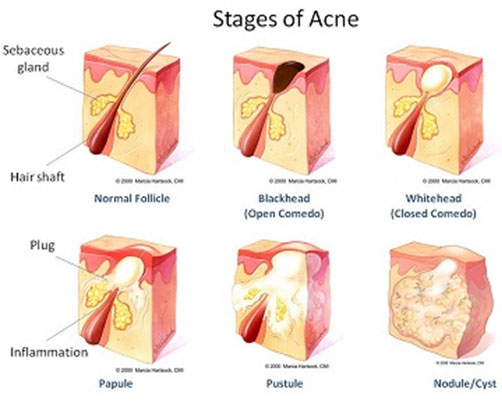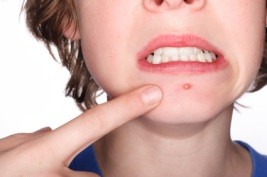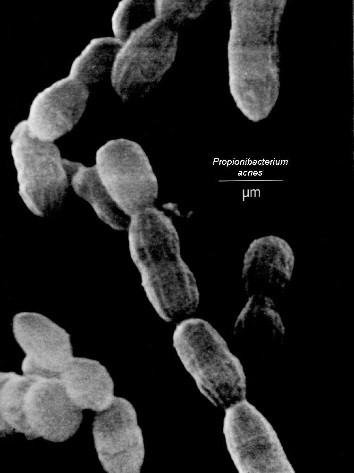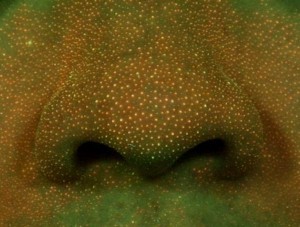What is acne?
Acne is a skin condition where spots or bumps appear on the skin surface. This problem occurs when skin pores get clogged with oil and dead skin cells. Acne can be categorized from normal to severe. Acne vulgaris including blackheads, white spots, papule, lymph and ‘cyst’ are among the most common acne.
Types of acne
-
Without inflammatory (blackheads and whiteheads)
-
Skin inflammatory and pus
Stages of acne
Acne developed when hair follicles are clogged with excess sebum or oil, together with dead skin cells and bacteria that trappedunder the skin surface. This causes swelling in various shapes and sizes. Mild acne like blackheads and white spots can be treated with drugs that can be obtained from pharmacies. Moderate to severe acne requires treatment by a dermatologist.

Myths about acne
-
Adults are not prone
Adult acne is also growing at the age of 30 ‘s, 40’s until 50’s
-
Chocolate and soda cause acne
No significant study associate them with the formation of acne.
-
UV protection creams cause acne
People who is allergic to chemical sunscreens, should change to physical sunscreens like zinc oxide.
-
Sweat causes acne
Sweat glands differ from sebaceous glands.
-
Treatment is not necessary for acne
Without proper treatment, acne will leave a scar.
-
Use scrub to get rid of acne
Abrasive procedure will leave scars.
Acne causes
-
Drugs; containing phenytoin, iodine, bromide, steroids, isoniazid & lithium.
-
Tight clothing/ equipment contact on the skin surface.
-
Greasy skin/hair care will clog pores.
-
Greasy & dirty environment.
-
Bacteria Propionibacterium acnes
-
Hormonal changes.
-
Excessive androgen such inpolycystic ovarian syndrome.

Association of bacteria and acne.
Propionibacterium acnes (P.acnes) is a bacteria that exists in the hair follicles in the skin pores. Several studies have linked the skin problem with P.acnes. Propionibacteria are gram-positive bacteria thatgrow in the low oxygen levels environment, such as in clogged pores.
P.acnes uses sebum as a source of energy. These bacteria have enzymes that digest fatty acids and triglycerides in the sebum. In anaerobic conditions, P.acnes use these materials and produce shorter chain fatty acids and propionic acid as a metabolic product. Sebum digestion by enzymes of P.acnes leads to comedogenic ingredients that worsen theacne symptoms.Colonies of P.acnes developed biofilmleading to antibacterial resistant. This will cause a prolonged infection in some individuals.
P.acnes bacteria do not cause damage to the skin directly. Skin damage is caused by the inflammatory reaction in the immune system. Purulent acne caused by excessive reaction of the immune system that sends white blood cells to destroy bacteria.

Propionibacterium acnes

Propionibacterium acnes growing in pores produces a fluorescent orange glow when illuminated by ultraviolet light
How to prevent acne outbreak?
-
Do not squeeze pimples
-
Do not touch your face frequently
-
Drink plenty of plain water
-
Eat a balanced diet
-
Take vitamin moderately
-
Change the makeup sponge and brush every 6 months to prevent bacterial growth.
-
Use a toner from natural ingredients such as lemon juice, peel banana and green tea for oily skin.
-
Use ‘non-comedogenic’cosmetics / personal care products.
Link
http://www.wikihow.com/Stop-or-Cure-Pimples
http://www.wikihow.com/Get-Clear%2C-Smooth-Skin
References
-
What is acne? http://www.exposedskincare.com/acne-treatment/what-is-acne.html (17 Aug 2013)
-
Yvette C. Terrie. Put Your Best Face Forward: Treatment of Acne Vulgaris. http://www.pharmacytimes.com/publications/issue/2013/May2013/Put-Your-Best-Face-Forward-Treatment-of-Acne-Vulgaris.html (17 Aug 2013)
-
What is Propionibacterium acnes? http://thescienceofacne.com/what-is-propionobacterium-acnes/ (17 Aug 2013)
-
Gibbon S.F et al. 2013. Propionibacterium acnes strain populations in human skin microbiome associated with acne. Journal of investigative dermatology 133, 2152-2160
| Last Reviewed | : | 28 January 2015 |
| Writer | : | Siti Noraziah bt. Abu Zarin |
| Translator | : | Siti Noraziah bt. Abu Zain |
| Accreditor | : | Nasrudin b. Muslim |







